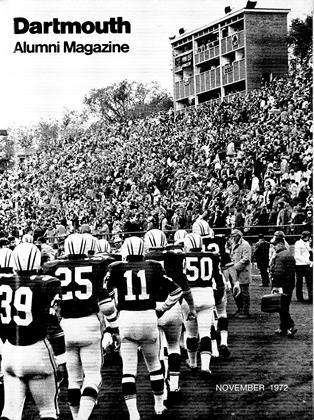ACTING PROFESSIONALLY: RAW FACTS ABOUT ACTING AND THE ACTING BUSINESS.
NOVEMBER 1972 ERIC FORSYTHE '69ACTING PROFESSIONALLY: RAW FACTS ABOUT ACTING AND THE ACTING BUSINESS. ERIC FORSYTHE '69 NOVEMBER 1972
By Robert Cohen'60. Palo Alto: National Press Books,1972. Paperbound. 101 pp. $1.95
Some facts from Cohen's book: "The median annual income for working professional actors is around $1100." The vast majority of American actors cannot work at their profession. "You cannot join the [acting] unions without a union job, and you cannot get a union job without belonging to the union." "In 1969, only one out of three working, professional, unionized Hollywood actors made as much as $200 a month ... Two out of three made less, or nothing." New York is even worse.
The monstrosity of the acting profession, appropriately called "the jungle," is, indeed, "filled with vice, lechery, corruption, avarice, deception and hypocrisy." Lust for success and literal struggle for survival become one and the same for the actor pounding the streets, hoping like thousands of others for any work at all.
The problem has a unique cause: anyone can pretend to be a professional actor. No other art, business, or profession is so easily invaded by fakes, panderers, and parasites, not to mention the countless sincere talentless and talented weaklings. The result: at any given time, between 75 and 85 percent of all unionized actors are unemployed. The number of non-union actors is staggering, each of these willing to go to unbelievable lengths to get into a union. And even union jobs hardly pay subsistence salaries relative to big-city standards. While the art of acting may be the most exhilarating life-experience, the profession of acting is surely the most brutal, destructive, and hopeless. Even established actors assume that each job will be their last, and most of them seek other sources of steady income.
Given this ugly situation, Cohen performs a magnificent service both to aspiring actors and to the theater by presenting the profession of acting in its myriad, unadorned aspects. Every professional I know flatly recommends to every new talent, brilliant or otherwise, to stay out of the theater. Says Cohen, "If I can discourage 90 percent of my readers from attempting a theatrical or film career, I will have done some service, for more than that number will surely fail in any case, and I will have spared them the trauma."
But the book is valuable in more than its negative stance toward the profession, for it compiles the attitudes, tips the facts an actor normally learns only after years of bitter experience. Cohen's scope is comprehensive: he covers everything from screen tests, union and non-union contracts, cheap restaurants and hotels in the theater centers, to making the resume, hiring the agent, and surviving the possible nude audition. And while the whole is appropriately discouraging and frank, it may start the beginning actor a step ahead in a profession where that may be all that matters. I know that many of my experienced actor-friends could benefit from the book. We can only wish that such a book had been available when we began our impossible careers.
Mr. Forsythe, a professional actor, is currently instructor of acting and directing atDartmouth.
 View Full Issue
View Full Issue
More From This Issue
-
 Feature
FeatureFour Views of Educational Opportunity at Convocation Opening the 203rd Year
November 1972 -
 Feature
Feature1972 ANNUAL REPORT
November 1972 -
 Feature
FeatureElection '72: A Historian's View
November 1972 By JAMES E. WRIGHT -
 Feature
Feature"A Greater Feminine Presence"
November 1972 -
 Article
ArticleBig Green Teams
November 1972 -
 Article
ArticleFaculty
November 1972
ERIC FORSYTHE '69
Books
-
 Books
BooksEUGEN ROSENSTOCK-HUESSY: BIBLIOGRAPHY-BIOGRAPHY.
December 1959 By ALEXANDER LAING '25 -
 Books
BooksAMERICAN FEMINISTS.
NOVEMBER 1963 By ALLEN R. FOLEY '20 -
 Books
BooksBIG BUSINESS – YOUR LIFE WITHIN IT.
October 1974 By JOHN HURD '21 -
 Books
BooksDEEP LAY THE DEAD
February 1943 By Oliver Linton Lilley '30. -
 Books
BooksHUMAN EMBRYOLOGY
October 1946 By W. W. Ballard '28 -
 Books
BooksMisused Decades
April 1980 By Walter W. Arndt


